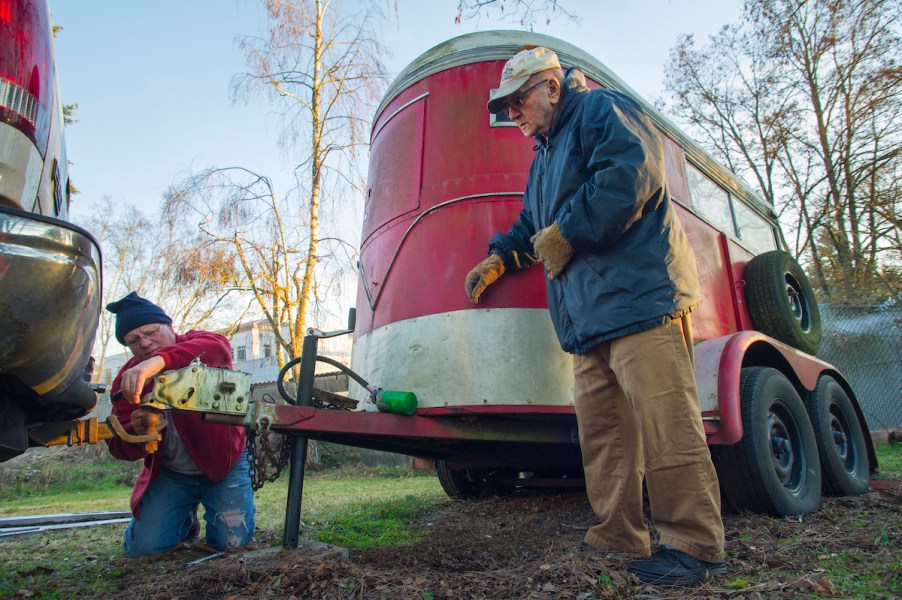
Greasing a Trailer Hitch Can Turn Into a Messy Job if You’re Not Careful
To grease a trailer or not to grease a trailer hitch? That is the question. Some RV owners consider it an essential part of routine trailer maintenance while others think it’s too messy to bother with. It can become quite a messy job when greasing your trailer’s ball hitch. Enough so that is becomes a major con and people prefer to avoid it despite the benefits.
Benefits od greasing your trailer hitch

Drivin’ & Vibin’ recognizes the objections surrounding greasing a trailer hitch but think the advantages outweigh the disadvantages. You’re likely to agree the first time you’re enjoying the peace and quite of an idyllic campsite when a travel trailer with a screeching hitch pulls in next to you.
Other advantages of an adequately greased hitch include protecting it from corrosion If it’s stainless steel it would protect it from friction wear or galling. The causes, results, and prevention of this type of “cold welding” are best explained by the RG Group.
Preventing corrosion and wear will give your hitch a longer useful lifespan. Therefore, a well-greased ball hitch won’t need replacing as often.
Probably the most noticeable issue that arises from not greasing your ball hitch regularly is the teeth-grating caterwauling that occurs every time you turn a corner or hit your brakes. You may not notice it much from the interior of your tow vehicle, but your thoroughly annoyed campground neighbors certainly will.
Reasons not to grease a trailer hitch
Let’s face it—greasing a ball hitch is messy. That mess tends to get everywhere, especially if kids or pets are running around. The slightest bump will result in grease getting on clothes or fur and inevitably into your camper.
If you get some grease on your clothes or the inside of your travel trailer, don’t try wiping it off. Grease will spread as you’re wiping. A small spot can quickly spread to the size of a dinner plate if you try wiping it off. Instead, there are a few different methods you can try. One is done by Silver Symbol. They recommend you not use soap and water when you get it on your skin, but use vegetable oil or olive oil you have around the house and a paper towel. However, the best way is to take preventative measures.
Covering your newly greased ball with a bucket or erecting a temporary barricade will help reduce the chances of a mess. Once you grease your ball hitch, it will start attracting dust, dirt, and grit. This can be hard on the receiver and is difficult to remove without thoroughly cleaning your hitch and regreasing it, which will start attracting dirt and grit all over again. Besides the damage that grit is doing, it also looks unsightly. If you prefer the look of a shiny, clean hitch, you may want to skip greasing it.
Greasing a trailer hitch
So, you’ve decided to grease your trailer hitch. Now what? The first step is to inspect your hitch for any signs of damage. Dents, severe scratches, and rust are all signs that it might be time to install a new hitch. If your current hitch is in good shape, thoroughly clean it. You want to remove all the dirt and old grease, so you’re left with a smooth, clean surface.
If there are minor rust spots, remove them with sandpaper and wipe away any of the sanding residues. Then liberally coat the entire ball with grease until all its surfaces are covered. Now it’s time to clean up. Carefully wipe your hands and inspect your clothing and shoes before entering your camper. Repeat the process once a month or so if you go RVing often, once a season otherwise.
A dry graphite lube will protect the hitch just like grease does, but it repels dirt instead of attracting it. It comes in two forms, as a spray or a dry powder. Only use the spray in a well-ventilated area and protect against overspray. Powdered Tube-o-Lube is less likely to make a mess.


